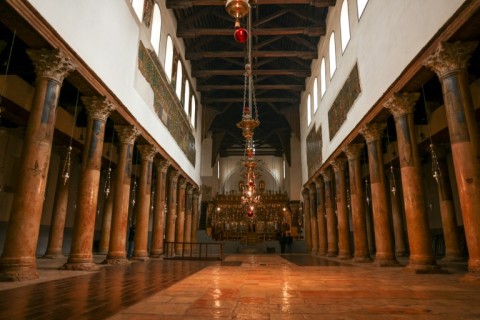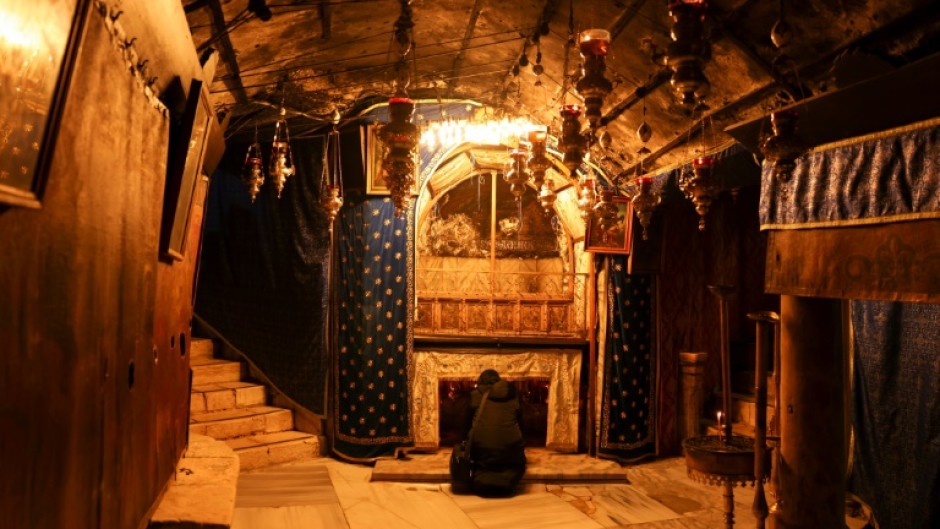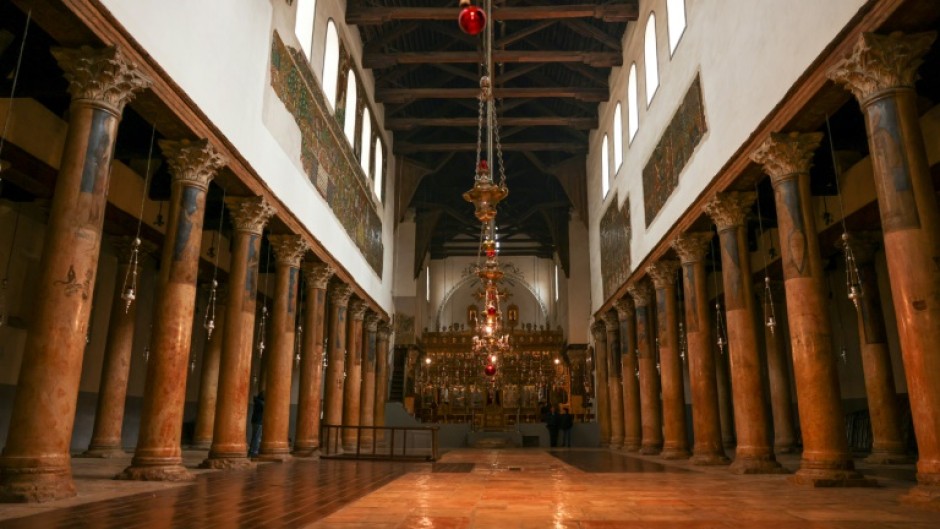Outside Bethlehem's Church of the Nativity in the Palestinian West Bank, the throngs of tourists and pilgrims who normally rub shoulders with costumed Santas and marching bands are missing this year.
There are no festive lights strung overhead and no sign of the huge tree normally erected to celebrate the event that Christians believe took place on this spot 2,000 years ago: the birth of Jesus Christ.
As the war between Israel and Hamas rages around 100 km (60 miles) away in Gaza -- leaving thousands of Palestinians dead and nearly two million displaced and trapped in a humanitarian catastrophe -- Christmas will be a muted affair in the occupied West Bank.
In a normal year, Bethlehem would be a "city full of people, full of tourists", said 30-year-old Abood Suboh, standing in his empty shop where he sells cashmere scarves and leather handbags.
"This war stopped everything."
- 'Tourists disappeared' -
Church leaders in Jerusalem and the Bethlehem city council took the decision last month to forego "any unnecessarily festive" Christmas celebrations in solidarity with Gazans.
The Latin patriarch of Jerusalem will still come to deliver his traditional midnight mass on Christmas Eve, but with pilgrims staying away and access to the city restricted by Israeli authorities, turnout is likely to suffer.
The war could not have come at a worse time for locals who depend on the Christmas tourist trade.
Jack Giacaman, of the Christmas House souvenir shop, said 80 percent of their sales came at the end of the year.

"Suddenly, in October, tourists disappeared from the streets. And now Bethlehem is completely closed from all directions," he said, referring to the Israeli checkpoints that restrict movement into the walled-off West Bank.
In the workshop behind Giacaman's store, half-finished shepherds and magi stood watch over deserted workstations.
He had already been forced to borrow money to tide over the business after the slump caused by the Covid-19 pandemic, but had a three-year plan to get back on track.
"Now we don't know how to cover this year," he said.
- 'Like living in a prison' -
Since the outbreak of the Gaza war, the West Bank has seen a surge in violence, with more than 290 Palestinians killed by Israeli forces or settlers, local health officials say.
Some pilgrims don't even realise Bethlehem is located in the West Bank, a Palestinian territory occupied by Israel since the 1967 Arab-Israeli War, Giacaman said.
"Sometimes they come to the shop and say, 'I'm happy to be in Bethlehem, Israel,'" he said.

The Church of the Nativity was empty during AFP's visit, save for a handful of workmen and small group of pilgrims.
Outside, Greek Orthodox priest Issa Thaljieh said Bethlehem was "grieving" the violence in Gaza.
And he regretted that pilgrims would not see the reality of life for Palestinians this year.
Visiting holy sites is important, he said, "but the most important is to know how Palestinians are living, how they are passing through the difficult situation daily, with the walls around, like living in a prison."
- 'All gone now' -
Franco-Palestinian restaurateur and hotelier Fadi Kattan, however, was sceptical that pilgrims learn much about the Palestinian cause.
Israeli tour operators nurture a perception that "all Palestinians are dangerous", turning them off interactions with locals, said Kattan, sitting on the terrace of his Bethlehem home that has been in his family for generations.
"For the pilgrims, it's like there's an invisible line where they don't go any deeper into the old city," he added.
Kattan -- who serves modern Palestinian cuisine at his restaurants Fawda in Bethlehem and Akub in London's Notting Hill -- had hoped to reopen his local businesses for Christmas this year after closing them during the pandemic.
"But that's all gone now," he said.
He said frightening wartime rhetoric from Israeli leaders had worsened the problem.
"If I was an American pilgrim, I would wait a few months to see what happens. Which is terrible to say, because it's a disaster for Bethlehem."


